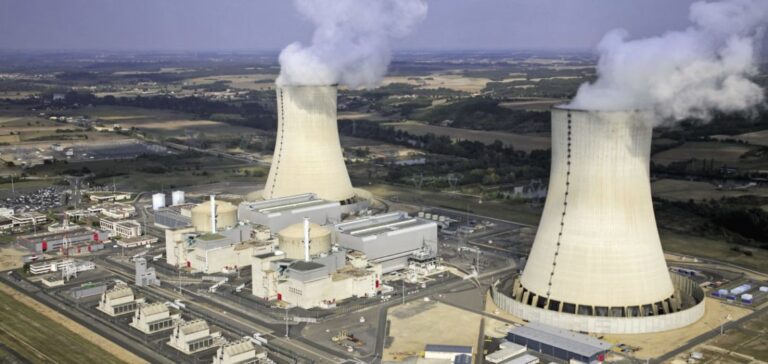This Thursday, the French executive presented its water plan in order to face the rarefaction of the resource.
French nuclear power plants consume three times less fresh water than initially estimated by the statisticians of the Ministry of Ecological Transition, according to their new figures published Wednesday on the eve of the presentation of the Water Plan. The consumption of water, to cool the reactors, is now estimated at about 0.5 billion cubic meters per year against some 1.7 billion in the previous assessment, reducing the share of nuclear power from 31% to 12% of total French consumption, according to figures published by the Service des données et études statistiques (SDES) of the Ministry of Ecological Transition.
In metropolitan France, the total volume of water consumed – which corresponds to the share of water withdrawn but not returned to the aquatic environment – is estimated at 4.1 billion m3 on average for the years 2010-2019, according to the SDES. “Agriculture is the first water-consuming activity with 58% of the total, ahead of drinking water (26%), the cooling of power plants (12%), and industrial uses (4%),” says the new assessment, unchanged in volume for the other sectors.
“We have had the opportunity in recent weeks to work more finely with energy companies to come and specify the reality of withdrawals and consumption of the park in a context where significant efforts have been made to contribute to the sobriety of water use,” justified a representative of the ministry during a presentation of the trip of President Emmanuel Macron Thursday to present the “Water Plan”.
The document of the administration put online Wednesday evening explicitly cites the contribution to this new calculation of EDF, which has provided the ministry with its figures since 2010. However, this reassessment is taking place in a context of increasing water scarcity due to global warming and the revival of nuclear power in France. In terms of gross withdrawals, the cooling of power plants consumes some 15.3 billion m3, i.e. almost half of the total annual withdrawals in France. All of these volumes are considered to be returned to the rivers for some plants. Only those with cooling towers, which spew out the emblematic plumes of steam, see a portion of the water fly away (about 22% according to the ministry).
“At the beginning of the year, we questioned the rather fragile assumptions” on which the previous estimates were based, explained to AFP Béatrice Sédillot, head of the SDES. General percentages had been applied to the colossal volumes withdrawn by all the power plants from the riverbanks in order to estimate the part consumed and not returned.






















